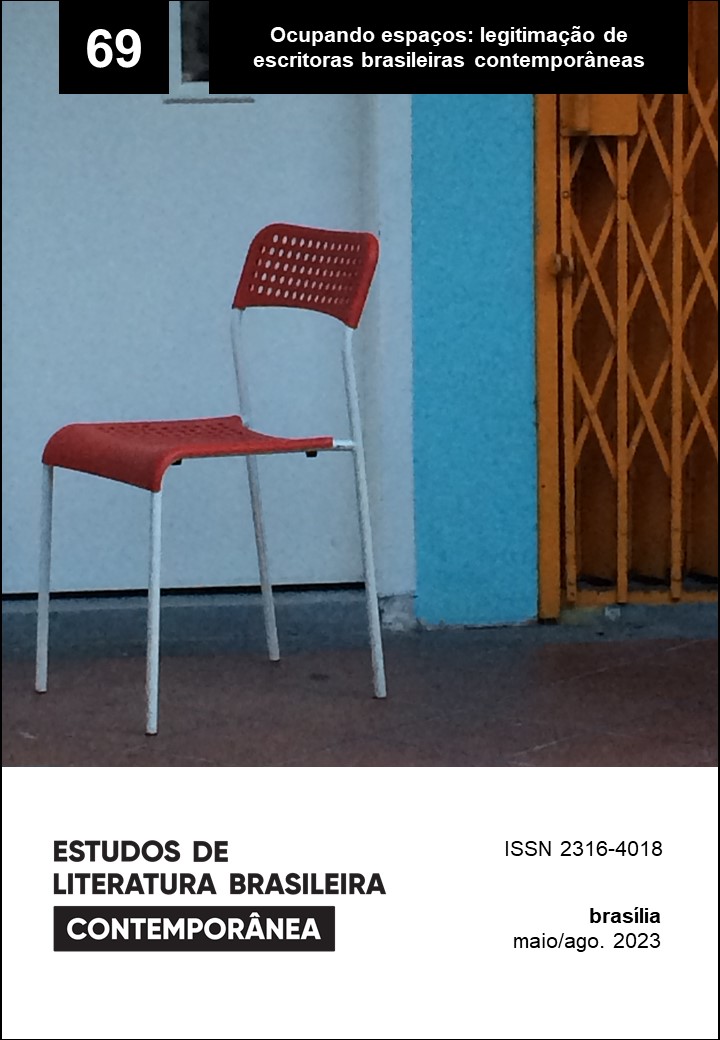Growing up as a consumer in the periphery: a look at consumption in Cris Lira's No país da infância
Keywords:
everyday life; consumption; peripheryAbstract
In this article, which focuses on the representation of consumption in the periphery in the short story collection No país da infância (2019), by Brazilian writer Cris Lira, I argue that, through an approach to everyday life, in Henri Lefébrvre's sense, which frames the everyday as that which is “humble and solid,” Lira's stories reflect and at the same time create affective and critical experiences of what it means to grow up in the Brazilian periphery in the 1980s and 1990s in the face of the pressures of consumer culture. I argue that Lira, by imagining the uses of several commodities, identifies what Hans Ulrich Gumbrecht (2006) calls “crises,” that is, small interruptions of everyday life (302) that the aesthetic experience with commodities is capable of producing. From this perspective, No país da infância makes a hopeful critique of consumer society, aligning itself with writers such as Marcus Vinícius Faustini (2009) in their representation of the periphery, as I argue elsewhere (Bezerra, 2022).
References
Bezerra, Lígia (2022). Everyday consumption in twenty-first-century Brazilian fiction West Lafayette: Purdue University Press.
BAUMAN, Zygmunt (2007). Consuming Life Cambridge: Polity Press.
DOUGLAS, Mary; ISHEROOD, Baron (2004). The world of goods Londres: Routledge.
EIGENMANN, Maya (2022). Instagram: @maya_eigenmann. Disponível em https://www.instagram.com/p/ClhaUlFJ1J0/?igshid=YmMyMTA2M2Y= Acesso em: 15 jan. 2023.
» https://www.instagram.com/p/ClhaUlFJ1J0/?igshid=YmMyMTA2M2Y=
FAUSTINI, Marcus Vinícius (2009). Guia afetivo da periferia Rio de Janeiro: Aeroplano.
GUMBRECHT, Hans Ulrich (2006). Aesthetic experience in everyday worlds: reclaiming an unredeemed utopian motif. New Literary History, v. 37, n. 2, p. 299-318.
LEFEBVRE, Henri (2005). Everyday life in the modern world Tradução de Sacha Rabinovitch. Nova York: Harper & Row.
LIRA, Cris (2019). No país da infância Belo Horizonte: Venas Abiertas.
MCNAMEE, Stephen J. (2018). The meritocracy myth Nova York: Rowan and Littlefield.
MIL E UMA HISTÓRIAS. Mulheres na literatura: entrevista com Cris Lira por Luciana Marinho Albrecht. Vídeo. 26 min e 17 s. Disponível em: https://www.youtube.com/watch?v=3zDZ2NHJ3po Acesso em: 15 jan. 2023.
» https://www.youtube.com/watch?v=3zDZ2NHJ3po
MILLER, Daniel (1998). A theory of shopping Ithaca: Cornell University Press.
MORAES, Maria Fernanda. Plano real, 20 anos: moeda trouxe novo ciclo de desenvolvimento econômico. UoL Disponível em: https://vestibular.uol.com.br/resumo-das-disciplinas/atualidades/plano-real-20-anos-moeda-trouxe-novo-ciclo-de-desenvolvimento-economico.htm Acesso em: 6 abr. 2023.
NIBERT, David Alan (2002). Animal rights/human rights: entanglements of oppression and liberation. Oxford: Rowman & Littlefield.
POETA PAULO DUTRA COMVIDA. Episódio 26: Literatura e café. Vídeo. 1 hora, 44 min e 12 s. Disponível em: https://www.youtube.com/watch?v=cj2dSFXyO0Y Acesso em: 15 jan. 2023.
» https://www.youtube.com/watch?v=cj2dSFXyO0Y
SCALCO, Lúcia Mury; PINHEIRO-MACHADO, Rosana (2010). Os sentidos do real e do falso: consumo popular na perspectiva etnográfica. Revista de Antropologia, v. 53, n. 1, p. 321-359. https://doi.org/10.1590/S0034-77012010000100009
Downloads
Published
Issue
Section
License

This work is licensed under a Creative Commons Attribution-NoDerivatives 4.0 International License.
Authors who publish in this journal agree to the following terms:
a) The authors maintain the copyright and grant the journal the right of first publication, the work being simultaneously licensed under the Creative Commons Attribution License-Non Commercial 4.0 which allows the sharing of the work with acknowledgment of the authorship of the work and publication this journal.
b) Authors are authorized to enter into additional contracts separately, for non-exclusive distribution of the version of the work published in this journal (eg publish in institutional repository or as a book chapter), with authorship recognition and publication in this journal.
c) Authors are allowed and encouraged to publish and distribute their work online (eg in institutional repositories or on their personal page) after the editorial process, as this can generate productive changes, as well as increase the impact and citation of published work (See The Effect of Free Access).
d) The authors of the approved works authorize the magazine to, after publication, transfer its content for reproduction in content crawlers, virtual libraries and the like.
e) The authors assume that the texts submitted to the publication are of their original creation, being fully responsible for their content in the event of possible opposition by third parties.


